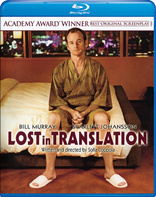Lost in Translation Blu-ray Movie
HomeLost in Translation Blu-ray Movie 
Universal Studios | 2003 | 102 min | Rated R | Dec 07, 2010Movie rating
8 | / 10 |
Blu-ray rating
| Users | 3.6 | |
| Reviewer | 4.0 | |
| Overall | 3.6 |
Overview
Lost in Translation (2003)
Bob Harris and Charlotte are two Americans in Tokyo. Bob is a movie star in town to shoot a whiskey commercial, while Charlotte is a young woman tagging along with her workaholic photographer husband. Unable to sleep, Bob and Charlotte cross paths one night in the luxury hotel bar. This chance meeting soon becomes a surprising friendship. Charlotte and Bob venture through Tokyo, having often hilarious encounters with its citizens, and ultimately discover a new belief in life's possibilities.
Starring: Bill Murray, Scarlett Johansson, Akiko Takeshita, Kazuyoshi Minamimagoe, Giovanni RibisiDirector: Sofia Coppola
| Drama | Uncertain |
| Romance | Uncertain |
Specifications
Video
Video codec: VC-1
Video resolution: 1080p
Aspect ratio: 1.85:1
Original aspect ratio: 1.85:1
Audio
English: DTS-HD Master Audio 5.1 (48kHz, 24-bit)
French: DTS 5.1 (48kHz, 24-bit)
Subtitles
English SDH, French, Spanish
Discs
50GB Blu-ray Disc
Single disc (1 BD)
BD-Live
Mobile features
Playback
Region free
Review
Rating summary
| Movie | 4.5 | |
| Video | 3.5 | |
| Audio | 4.0 | |
| Extras | 2.5 | |
| Overall | 4.0 |
Lost in Translation Blu-ray Movie Review
For heartbreaking times, make it Coppola time.
Reviewed by Casey Broadwater December 9, 2010Director Sophia Coppola’s first three films, The Virgin Suicides, Lost in Translation, and Marie Antoinette—however different they are—form a loose thematic trilogy about girls on the cusp of womanhood confronting their feelings of ennui and alienation. The troubled suburban daughters of The Virgin Suicides find a violently tragic solution by offing themselves in sequence. Marie Antoinette, of course, lost her head—in more ways than one—to a public who misunderstood her frivolity. But Lost in Translation, paradoxically, is both more positive, in that we can imagine the film’s doe-eyed heroine eventually finding her purpose in life, and more redolently heartbreaking—with perhaps the saddest happy ending in recent memory—than either of its bookends. It’s a film that’s filled with contradictions. It’s about being alone in a city of millions and traveling thousands of miles only to spend an inordinate amount of time in the hotel bar. It’s a melancholic comedy and a platonic romance. And it’s a kind of reverse Harold and Maude, about two people, disparate in age, discovering that they’re soul mates. Bittersweet comes closest to summing it up, but the word is too small to contain the film’s varieties of emotional experience.
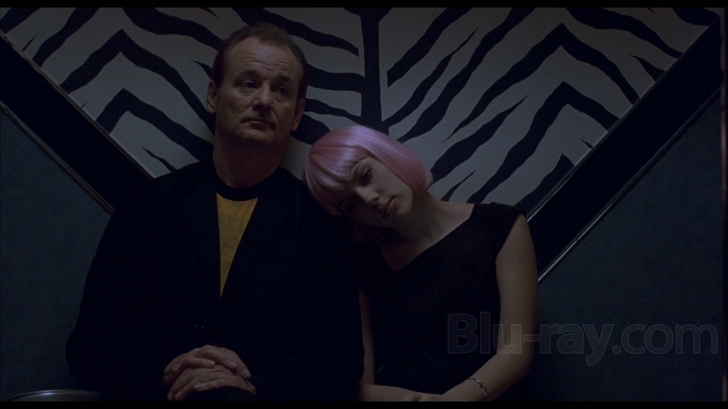
Bill Murray plays a distorted, funhouse-mirror version of himself as Bob Harris, an aging American movie star who has come to Tokyo to film a Suntory whisky commercial—to the tune of $2 million—when he “could be doing a play somewhere.” (Coppola, who also penned the script, wrote the role with Murray in mind.) It’s easy money, but there’s clearly no joy in it. After a day spent receiving bewildering direction in spit-fire Japanese —“Are you sure that’s all he said?” he asks his overly concise translator—Bob sits at the bar in the Tokyo Hyatt and tries to avoid conversation with gawking gaijin fans. He’s jetlagged, on edge. His wife keeps sending him obnoxious faxes about color swatches for the carpet in his den. He couldn’t care less—he’s fully absorbed in a mid-life, mid-career crisis. Meanwhile, recent Yale graduate Charlotte (Scarlett Johansson) is having an early-life, no-career crisis—that is, she has no idea what she wants to do with her philosophy degree. (“I hear there’s a buck in that racket,” Bob later tells her.) She’s in Japan with her rock ‘n’ roll photographer husband (Giovanni Ribisi), who goes off for days at a time on assignment, leaving her to putz around the hotel and occasionally venture out into the city. Charlotte and Bob are both bored, overwhelmed, and wide awake; when they meet at the bar they recognized one another as mutually displaced persons. The instantaneous friendship they strike up would seem unlikely anywhere else, but here—as strangers in a strange, strange land—it makes uncommon sense.
And the resulting relationship is definitely uncommon. The film magnetically resists rom-com cliché. As Bob and Charlotte traipse around Tokyo, the possibility of a sexual, May-to-December relationship hangs around them like electrically charged air. A less thoughtful director would have them hook up, but Coppola realizes that desire withheld—longing, rather than having—is endlessly more satisfying. While the tension between the two is powerful—when they lock eyes in a karaoke booth, when they share an awkward parting kiss in an elevator, when he tucks her into bed—it exists as a kind of volcanic force, surging under the surface of the story. The need these characters fulfill for one another is ultimately not sexual but existential. Charlotte’s youth sparks in Bob a realization that he needs a change, and in Bob, the aimless young wife finds fatherly guidance, the reassurance of someone who’s been there before. That they meet and share this symbiotic attachment for only the briefest of windows—one crazy week in Tokyo—is a thing of painful beauty and exquisite sadness. Impermanence, imperfection, and restraint are the basis of classical Japanese aesthetics—the cherry blossom is beautiful because it falls so soon, the crack in the clay defines the character of the pot, a pregnant pause says more than a wordy monologue—and Lost in Translation is steeped in these traits like a particularly fine tea.
Which is yet another contradiction. For as much as Lost in Translation is informed by an emotional resonance that is essentially Japanese, its characters view the country through a warped lens of typically American cultural ignorance. Bob is in a state of near-constant bewilderment, and much of the film’s comedy is predicated on stereotypical notions of the Japanese as short, unfathomably alien, redundantly polite people who mix up their L’s and R’s. Some of the jokes are much too broad—as when a high-class call girl, a gift from a Suntory exec, tells Bob to “lip” her stockings— but I think it’s unfair to label the film, as some have, as inherently racist. As an American who once lived in Japan, I’ll freely admit: there were moments when, at 6’6”, I stood out like a sore, blond-and-blue-eyed thumb. There were times when the esoteric code of Japanese etiquette was utterly baffling. I’ll even cop to finding it secretly hilarious anytime my co-workers brought up the 2008 elections. (Go on, substitute the L with an R.) I say all that to say this: the characters in Lost in Translation are only in Japan for a few days. They don’t have time to see past the stereotypes. They are the aliens here, and the isolation they experience as gaijin—literally, “other person/people”—wakes up the dormant emotions and doubts inside themselves. "I went to this shrine today and there were these monks and they were chanting and I didn't feel anything,” Charlotte cries to a friend on the phone. “I even tried ikebana, and John is using these hair products...I don't know who I married." It’s basically culture shock as psychotherapy.
It is tempting to view Lost in Translation in personal terms, to see Scarlett Johansson as a Sophia Coppola avatar—unsure of how to escape her father’s looming shadow—and Giovanni Ribisi as Coppola’s eccentric ex-husband, Spike Jonze. (And, come on, Anna Faris, as the ditzy blond starlet doing a press junket at the Hyatt, is clearly Cameron Diaz.) But I’ll leave that to the speculations of Coppola’s inevitable biographers. The film stands on its own as a piece of fragile, wryly funny, quietly devastating art. Bill Murray is perfect. He doesn’t simply ape his own persona, but rather, builds a character with real depth and nuance. His Bob is wounded and world-wearied, increasingly aimless and unsatisfied. When he jokes with his Japanese hosts, it’s with the tired humor of a man who just wants to get through the day. His phone calls with his wife are incessantly awkward—when she asks, “Do I need to worry about you Bob?” he replies, “Only if you want to”—and you get a sense that though he may be a reluctant family man, he loves at least the idea of having a wife and kids. Charlotte just wants to know if it will get any easier —“That's hard,” says Bob—and Johannson wonderfully conveys the curiosity, intelligence, and grief of a young woman who has yet to find herself. When the two eventually go their separate ways, parting has never been sweeter sorrow. Bob whispers something in Charlotte’s ear and her eyes well up. We don’t hear the words, but we don’t need to. She’s going to be okay.
Lost in Translation Blu-ray Movie, Video Quality 
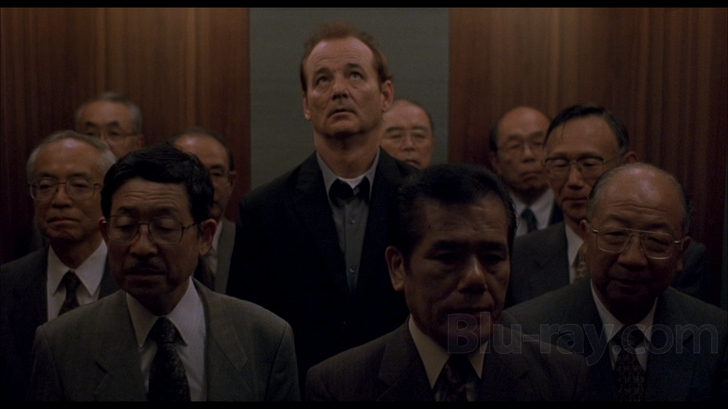
Lost in Translation made an appearance on HD-DVD way back in 2007—ages ago—and while I can't confirm, it seems likely that
Universal simply reused that disc's VC-1 encoded transfer for this new Blu-ray release. (Or possibly made a new encode from the old master.) An
important thing to keep in mind when evaluating any film's
picture quality is the way that it was shot; in the case of Lost in Translation, DP Lance Acord's cinematography was what you might call "quick
and dirty," using mostly natural illumination and, at times, fast—and, therefore, grainy—film stock to capture images in low ambient light. This affects
the look of the film in a number of ways. For one, the overall aesthetic is more natural—not as glossy or stylized as most Hollywood productions.
However, this comes at the expense of certain traits that videophiles look for in "reference" quality material. In my opinion, "reference" is how the film
was intended to look, taking into account the type of technology used (film or digital video) and the resolution (16mm or 35mm, SD or HD, etc.), but
that's an argument for another time. Here, contrast is weak—partially a result of not using additional fill light to give "contour" to the image—and
shadow detail, during darker scenes, is frequently lost in a sea of murky blacks. (See most of the scenes shot at the hotel bar.) Likewise, color is
realistically restrained and clarity varies drastically—the daylight scenes tend to look fantastic, with lots of detail, while the textures in evening or interior
sequences have a tendency to appear spongy and soft. (The iconic shot of Murray sitting on his bed in a yukata—used for the cover art—is so
soft as to look blurry.)
Much of this has to do with the techniques used to shoot the film, but it also seems to me that this particular encode isn't necessarily doing the film any
favors. I'm only speculating, but it's reasonable to assume that the black levels don't need to be as oppressive as they are here. And while the film's
grain structure looks fairly natural, there are distracting flurries of chroma noise in darker portions of the picture that sometimes give the image a
blotchy, mottled quality. All said, Lost in Translation does look markedly better here than it ever did on DVD—enough to warrant an upgrade—
but I'd love to see the film get a more refined high definition treatment sometime in the future.
Lost in Translation Blu-ray Movie, Audio Quality 
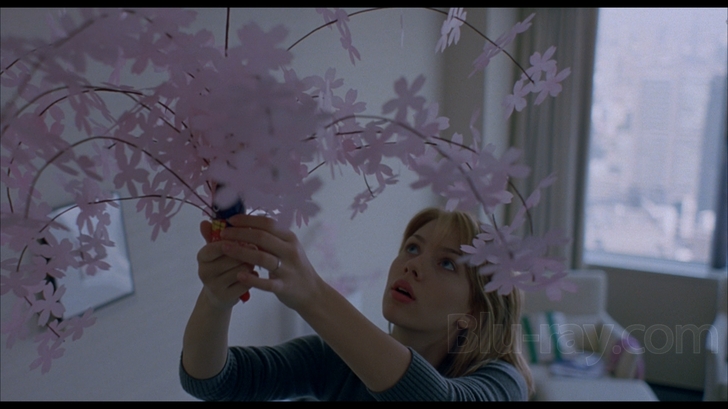
Where the HD-DVD only included a lossy Dolby Digital Plus mix, the Blu-ray comes with a lossless DTS-HD Master Audio 5.1 surround track. If you've ever been to Tokyo—especially the areas featured in the film, like the enormous crosswalk outside Shibuya station—you know that it's a loud city, with an ever-present amalgam of traffic sounds, pedestrian bustle, and salespeople beckoning you into their shops. The film occasionally puts this urban cacophony to immersive use—you'll be assaulted from all sides by the noise of a pachinko parlor, the digital clamor of an arcade, the roar of street sounds, even air-soft pellets zipping through the rear channels—but not nearly as often as you might think. More frequently, Coppola puts her characters in a quiet bubble of their own thoughts, accompanied by a killer ambient soundtrack with numerous cuts from My Bloody Valentine's Kevin Shields. It's some of my favorite film music from the 2000s, and it sounds great here. There are a few instances when dialogue could potentially sound a bit cleaner, but most of the time the actors' voices ride clearly on top of the mix. You could easily imagine this track sounding bigger and more engaging, but that might steal from the film's subtlety.
Lost in Translation Blu-ray Movie, Special Features and Extras 
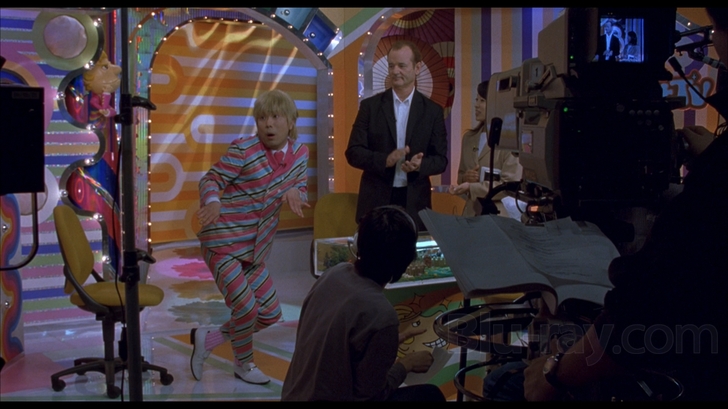
Lost in Translation's Blu-ray supplements are practically identical to its DVD counterpart, with the new addition of a brief sneak peak of Sophia Coppola's upcoming film, Somewhere.
- Deleted Scenes (SD, 10:35): Unfortunately, there's not much of interest here. The bulk of the excised material consists of the complete press conference for Anna Faris' Cameron Diaz-ish character's Midnight Velocity film.
- A Conversation with Bill Murray and Sophia Coppola (SD, 9:31): Shot on some rooftop in Rome, Murray and Coppola discuss their working relationship.
- "Lost" on Location (SD, 29:38): I'm not going to lie; this is one of my favorite "making of" documentaries ever. It's all shot very casually, following Sophia Coppola and Co. as they film around Tokyo, and there's some great bits with Billy Murray being funny on set. Oh, and the first part was shot by Coppola's former husband, Spike Jonze.
- Matthew's Best Hit TV (SD, 4:36): The full version of the zany "Matthew's Best Hit TV" segment.
- Kevin Shields "City Girl" Music Video (SD, 3:03): If you're a My Bloody Valentine fan, hopefully you've already seen this by now.
- Theatrical Trailer (SD, 2:16)
- On the Set of Sophia Coppola's Somewhere (1080i, 3:34): A quick on-set look at Somewhere, including a synopsis and interviews with Coppola and the film's stars.
Lost in Translation Blu-ray Movie, Overall Score and Recommendation 
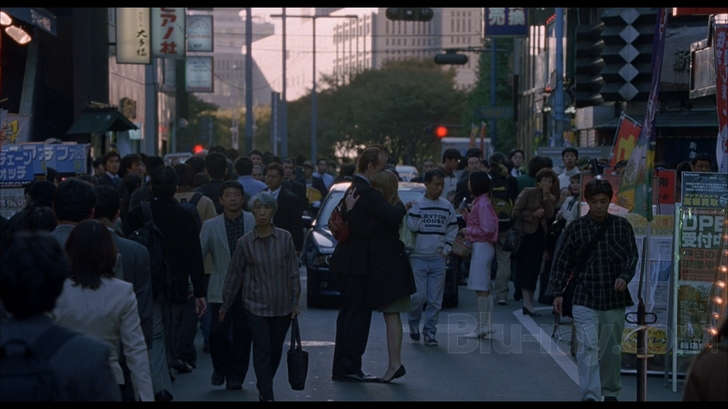
Lost in Translation is a beautiful, moving film, and if you give into it fully, it will absolutely wreck you. It's also a sly comedy of displacement and culture clash. Like I said above, it's filled with contradictions. This Blu-ray disc from Universal isn't quite as impressive as the film itself—the transfer seems to have been recycled from the adequate-but-not-superlative HD-DVD release in 2007—but if you've worn out your DVD copy of the film, I have no qualms recommending an upgrade. And if you've never seen the film before, definitely give it a chance. It was my favorite film of 2003 and it's Sophia Coppola's best. Recommended!
Similar titles
Similar titles you might also like

Sideways
10th Anniversary Edition
2004

My Blueberry Nights
2007

Greenberg
2010

Paterson
2016

Casablanca 4K
80th Anniversary Edition
1942

Somewhere
2010

While We're Young
2014

The Disappearance of Eleanor Rigby
Includes "Him", "Her", and "Them" Cuts
2014

Her
2013

The Landlord
1970

Bellflower
2011

Kumiko, the Treasure Hunter
2014

Metropolitan
1990

Frances Ha
2012

Eternal Sunshine of the Spotless Mind
2004

Call Me by Your Name
2017

Paris, je t'aime
2006

Columbus
2017

First Cow
2019

Is Anybody There?
2008
